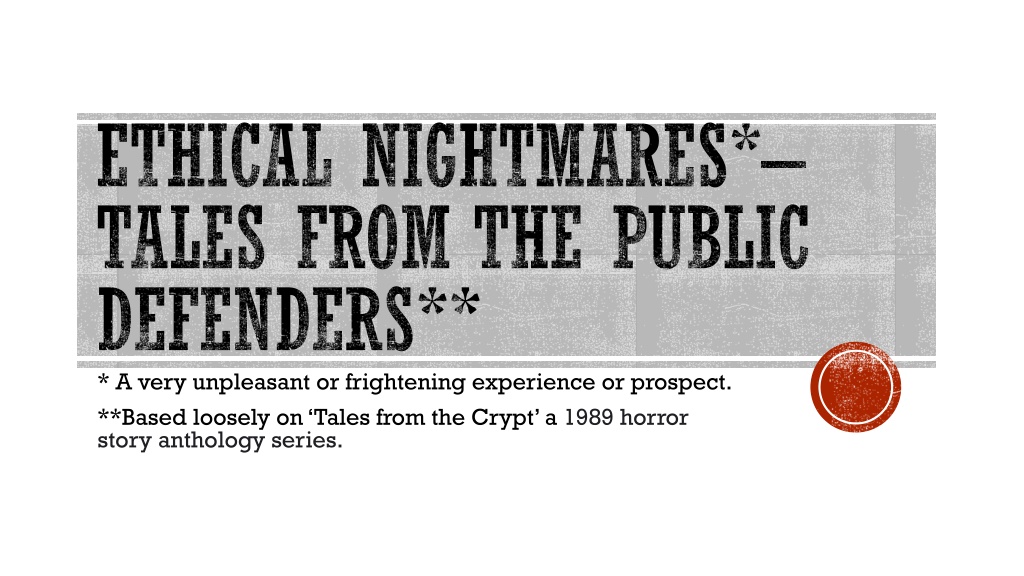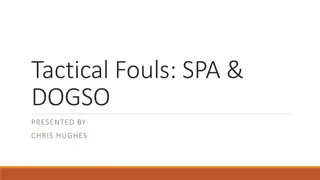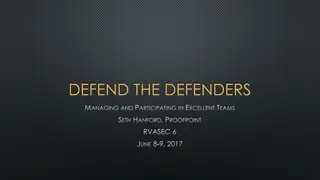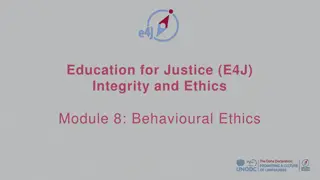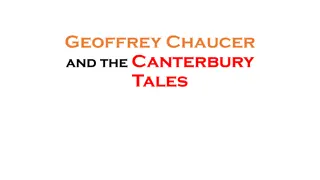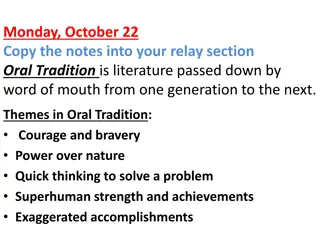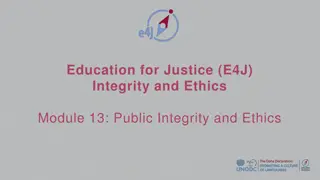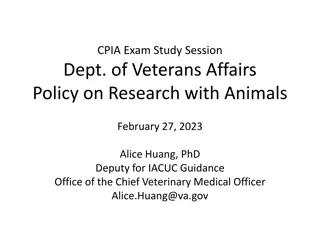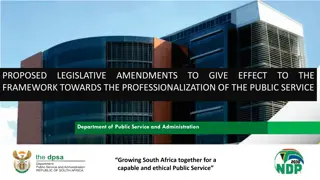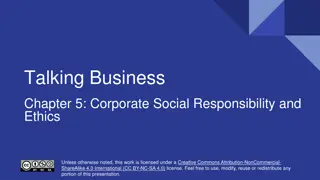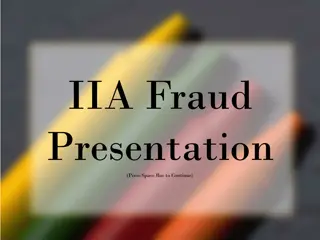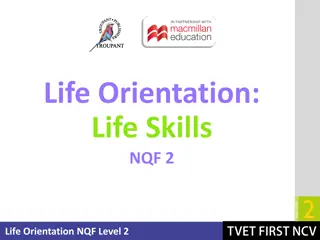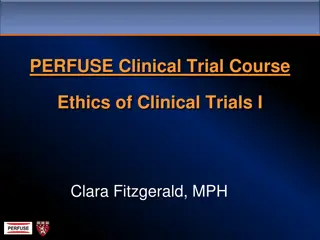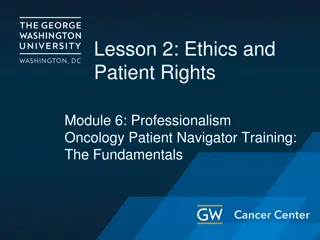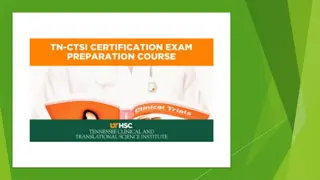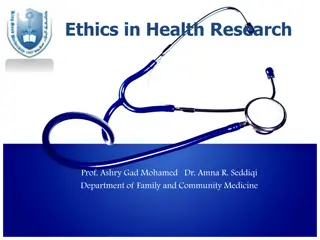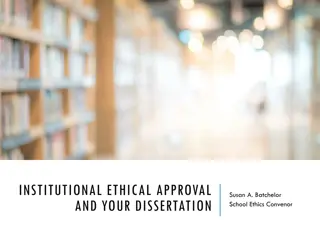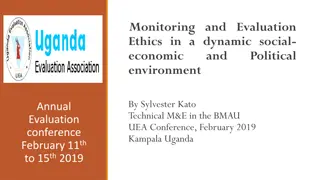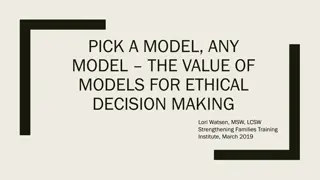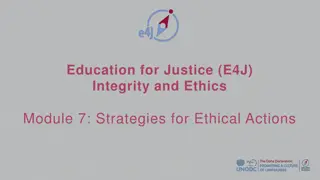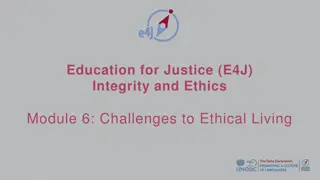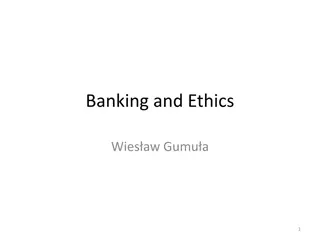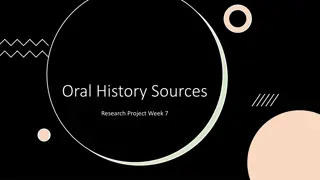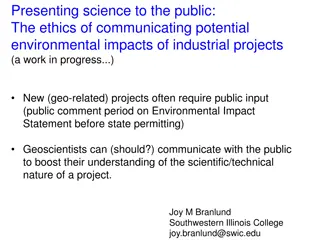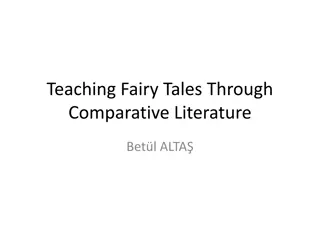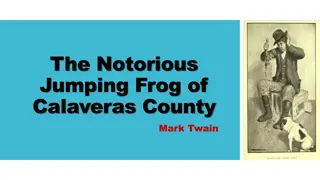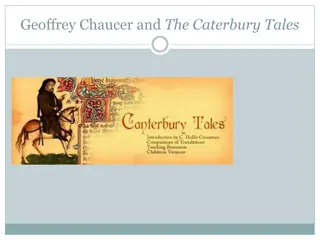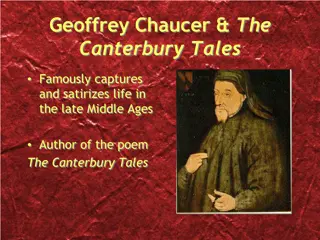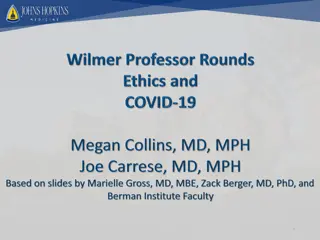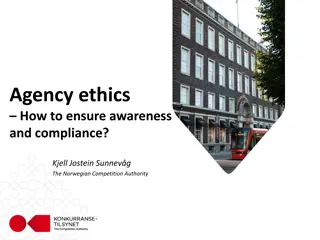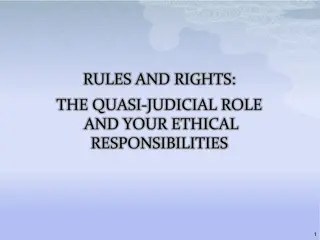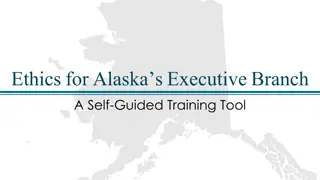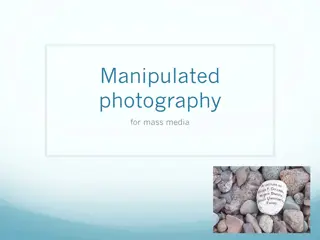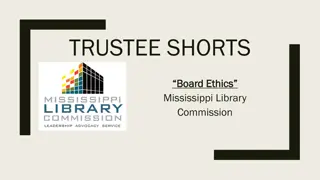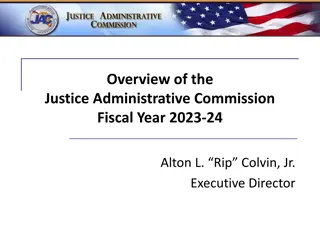Ethical Nightmares: Tales from the Public Defenders
Explore the complexities of ethical challenges faced by public defenders in the legal profession, examining the delicate balance between duty to the court and duty to the client. Through a collection of thought-provoking insights and real-world experiences, delve into the blurred lines and moral dilemmas that shape the reputation and conduct of legal practitioners.
Download Presentation

Please find below an Image/Link to download the presentation.
The content on the website is provided AS IS for your information and personal use only. It may not be sold, licensed, or shared on other websites without obtaining consent from the author. Download presentation by click this link. If you encounter any issues during the download, it is possible that the publisher has removed the file from their server.
E N D
Presentation Transcript
ETHICAL NIGHTMARES* TALES FROM THE PUBLIC DEFENDERS** * A very unpleasant or frightening experience or prospect. **Based loosely on Tales from the Crypt a 1989 horror story anthology series.
ETHICS MATTER. A reputation for proper, ethical conduct is one of the most important assets a lawyer can have. Reputation, reputation, reputation! O, I have lost my reputation! I have lost the immortal part of myself, and what remains is bestial. ( Othello per Cassio, Act 2 Scene 3) It take many good deeds to build a good reputation, and only one bad deed to lose it. (Benjamin Franklin) One can survive everything, nowadays, except death, and live down everything except a good reputation. (Oscar Wilde)
THE HONOURABLE PROFESSION. Lawyers Weekly asked a few years ago why do people hate lawyers? A sample of comments on that article: Money motivated shysters They outright lie, most will hide, distort, stretch or otherwise bastardise the truth. Lawyers are pompous, manipulative, disingenuous, arrogant, two faced, patronising, and greedy. There is nothing to like. Lawyers have turned into the intellectual servants of the rich, the cultural equivalent to court jesters of a bygone era. People hate lawyers because they are spiritually bankrupt many of them lie with so much ease as if it were a bodily function . People hate lawyers because they are lying low life con artists who rip people off . Lawyers are like nuclear weapons. You only need one because the other side had one and the world would be a better place without them. They will lie, distort and make false accusations just to win a case. Truth is irrelevant. They call it a vigorous defence, to everyone else, it s just plain lying . I am a horrible lawyer and quite a jerk, most of the time .
WHY DO THINGS GO WRONG? The professional rules do not cover the field. Your life outside of work is on fire and you make poor decisions. You want to win your case at all costs. Your desire to help your client is unchecked. You are inexperienced and inadequately supervised. Beware the ethical creep .
ETHICS IS NOT ALWAYS EASY The professional conduct rules are taught as a blueprint but when applied in practice can blur into a pool of grey. Legal Profession Uniform Law Australian Solicitors Conduct Rules 2015 Legal Profession Uniform Conduct (Barristers) Rules 2015 Legal Profession Uniform Legal Practice (Solicitors) Rules 2015
TWO MAJOR SORE POINTS Duty to the court v duty to the client. In Giannarelli v Wraith (1988) 165 CLR 543 Mason CJ said at 556: The performance by counsel of his paramount duty to the court will require him to act in a variety of ways to the possible disadvantage of his client. Counsel must not mislead the court, cast unjustifiable aspersions on any party or witness or withhold documents and authorities which detract from his client s case. And, if he notes an irregularity in the conduct of a criminal trial, he must take the point so that it can be remedied, instead of keeping the point up his sleeve and using it as a ground for appeal. Decisions often must be made quickly Any judge who is invited to make or contemplates making an order arising out of an advocate s conduct of court proceedings must make full allowance for the fact that an advocate in court, like a commander in battle, often has to make decisions quickly and under pressure, in the fog of war and ignorant of developments on the other side of the hill. Mistakes will inevitably be made, things done which the outcome shows to have been unwise. But advocacy is more an art than a science. It cannot be conducted according to formulae poetically put by one Lord Bingham of Cornhill in Ridehalgh v Horsefield [1994] Ch.205.
ALTHOUGH, SOME LINES ARE BRIGHT Don t do these obvious things (which amazingly are things lawyers do and get in trouble for at the NCAT all the time) Don t commit a crime. Don t falsely witness affidavits. Don t swear affidavits in which you say false things. Don t steal or borrow money from your clients. Don t do dodgy things with trust accounts. Don t sexually harass your staff or volunteers. Or anyone else for that matter! Don t abuse your colleagues. Or the Court. Or your opposition. Don t lie to the Law Society, especially if they are investigating you.
CIVILITY, COURTESY AND PROPER COMMUNICATIONS Incivility, lack of courtesy and improper communication can amount to professional misconduct. Examples include: using offensive or provocative language, including swearing at a client or fellow practitioner; discriminating against a client or a fellow practitioner; physically intimidating, threatening or assaulting a fellow practitioner or a client; physically intimidating, threatening or assaulting a witness; making statements (without justification) during proceedings that are disrespectful or which allege dishonesty or impropriety to the court or fellow practitioners; using offensive and intimidatory language in correspondence to fellow practitioners, clients or opposing parties; using offensive and intimidatory language in correspondence towards investigating authorities; and sexual misconduct.
ONGOING ISSUES WITH DISCOURTEOUS AND ABUSIVE LAWYERS Recent decision on importance of courtesy in the practice of law - Council of the Law Society v Sideris [2024] NSWCATOD Some examples of the impugned communication to the solicitor s opponent in the Sideris case: As to you not wanting to discuss the matter is pathetic and I am concerned about you calling yourself a lawyer . You can play your childish games but remember we are both lawyers and your senior partners will soon hear about your antics You want to complain to the law Society, well let s see who wins here you pathetic human. I do not want to say things that will upset me as a gentleman and you. But you can imagine what I would say to you so let's leave it at that. Mate I was a lawyer when you were in nappies so I suggest you grow up or we can really have a fight. In short,I could say f k off but I am too much of a gentleman trying to protect a 91-year-old that needs help
ONGOING ISSUES WITH DISCOURTEOUS AND ABUSIVE LAWYERS (CONT D) In Legal Services Commissioner v Potkonyak [2017] NSWCATOD 74 He submitted that the Director-General was engaging in an abuse of process and stated it was below his dignity to take part in proceedings on this kind. He submitted to the court that my impression is that your Honour had really made up his mind and we are wasting our time and money here and that overruling my objection so easily off the cuff tells me that well your Honour is bent . Why doesn t your Honour make the orders that we go home, wasting everybody s time. In Council of the Law Society of NSW v Griffin [2016] NSWCATOD 40 practitioner sent a letter to the Judge requesting the Judge vary his decision, making serious allegations that the Judge had: acted vindictively; may not have written the judgment himself; and acted without good faith and with bias.
HOW TO APPROACH AN ETHICAL ISSUE. Be intuitive. What does my gut say? 1. Be smart. Do I need to act on this issue right now? 2. Be a lawyer. What do my professional rules say? 3. Phone a friend. What do my colleagues say? 4. Escalate. What does the Law Society or the Public Defender s (or any experienced Barrister) say? 5. Document it. File note your decision and reasoning. 6. Move on. 7.
REAL LIFE NIGHTMARES TALES FROM THE PUBLIC DEFENDERS
REAL LIFE NIGHTMARE 1 A MASS CASUALTY EVENT A PD was representing Client A in a high-risk offender matter, instructed by Legal Aid. His cell mate was represented by Legal Aid. One of the live issues was future risk. His cell mate told his lawyer that Client A had told him that when he was released, he was going to commit a mass casualty event. This was threat was credible and within Client A s capabilities. Client A s lawyer called the PD and told them of this development. The PD put the phone down and thought another day in paradise . Let s talk about what the PD did next, apart from having a lie down.
REAL LIFE NIGHTMARE 2 I ACT FOR YOU, AND YOU, AND YOU. OH, YOU TOO. A private solicitor with a Legal Aid grant called her PD in a quandary. She had recently instructed the PD in a high profile murder trial in which the client had suddenly qualified for Legal Aid. The matter was already listed for trial. There had been some recent conferences with the client in which it became clear that based on the ERISPs of the co-accused and the client s instructions, that the co-accused would likely need to be cross-examined at trial if they gave evidence. The Crown had also given notice that some other witnesses would be called to give evidence who had previously been sentenced for affray arising from the same events. The solicitor explained to the Public Defender that she had previously acted for two of the co- accused up until committal. She had also acted for the three clients who had been sentenced for affray. Let s talk about the advice that was given.
REAL LIFE NIGHTMARE 3 SEX, LIES AND VIDEOTAPE A PD and a Legal Aid lawyer were representing a client charged with a sexual assault offence. It was not in dispute that the client and the complainant had sexual intercourse on a single occasion (and only once, ever). Consent was in issue. In the week leading up to the trial, the client started to ask questions like: what impact would it have on my case if I had a recording of the sexual intercourse and it showed that the complainant was consenting? The PD advised the client that such evidence would be exculpatory. Within a few days, the client produced a recording which was clearly of him having sexual intercourse with someone who he instructed was the complainant. The legal team had not seen the complainant and do not know if this is correct, but he is adamant. Let s talk about what happened.
REAL LIFE NIGHTMARE 4 INDECENT PROPOSAL A solicitor called a PD after Court in a state of high distress. Earlier that day, he had appeared in a DV hearing. Before Court, he saw the complainant outside having a smoke. He introduced himself and asked if they could talk, telling her that the prosecutor would have no problem with it, it was totally normal and there was no property in witnesses. What he had meant to do was ask some questions about a previous incident with her father which was somehow relevant to his client s case. However, before he went into this, he told the complainant that he needed to ask questions because this was making things very hard for his client who was going to lose his job, would be unable to pay her child support and that it was very important for everyone that she didn t tell porky pies or bad consequences would flow. The complainant then told the prosecutor that she did not want to be involved anymore because she was worried about what the solicitor had said. The prosecutor then took a statement from the complainant about this and told the solicitor to expect a complaint or criminal charge. He says he doesn t understand what he did wrong. Let s talk about the advice that was given.
REAL LIFE NIGHTMARE 5 INSPECTOR GADGET A solicitor sought advice from a PD about an uncomfortable conversation she just had with a client acted for and was awaiting sentence. The client called her asking for help to get his phone back from the Police. During the phone call, the client mentioned that he needed the phone back to organise work and he was sick of being unemployed for the last 6 months. This puzzled the solicitor because two weeks earlier she had tendered during sentencing proceedings a letter from a landscaper telling the court that the client was working with them. She had concerns about the letter when she received it but just tendered it anyway. She wanted to know if she had a duty to work out whether she had tendered a false document. Let s talk about the advice that was given.
REAL LIFE NIGHTMARE 6 SILENCE OF THE LAMBS A solicitor called a PD in the middle of a hearing. During the hearing that day, the prosecutor had submitted to the court that the accused had no criminal history and tendered his NSW record showing as much. However, the solicitor knew that the client had lived for some time in QLD and according to the client had quite an extensive out of state criminal history. When the prosecutor tendered the (no) record, the solicitor stared steadfastly down at the bar table and said nothing. When his client gave evidence, his client spoke about some phone calls he had with the complainant when he was in QLD but they were only short calls because of the control freaks in lock-up . The Magistrate later asked the solicitor if his client had a criminal history in QLD. The solicitor said, I have no evidence about that. The solicitor wanted to know whether he needed to go back in and say something more. Let s talk about the advice that was given.
REAL LIFE NIGHTMARE 7 SHOULD I STAY OR SHOULD I GO NOW? A Legal Aid solicitor emailed a PD asking a tricky question. She had a client who had entered a plea of guilty to dangerous driving causing GBH. She had advised the client from the outset about the meaning of GBH and that the injuries outlined in the facts may not amount to GBH. For various practical reasons, the client chose to enter a plea of guilty. The backup charges were withdrawn. On sentence, her Honour queried whether GBH was made out in the facts and suggested she may reject the plea but gave the prosecution additional time to serve further material about the injuries. That material was served but it was still question about about the GBH. The solicitor wanted to know she could argue that the material in the new report didn t amount to GBH or was she conflicted given that she entered the plea on behalf of the client originally (accepting the element of GBH). Let s talk about the advice that was given.
A NOTE ABOUT CLIENTS PLEADING GUILTY WHEN THEY RE NOT AND PLEADING NOT GUILTY WHEN THEY ARE Common issues. One situation covered by the professional conduct rules, the other is not. 2011 Paper by Benjamin Bickford (then ALS) Convenience Pleas Emphasis on taking care and obtaining written instructions.
